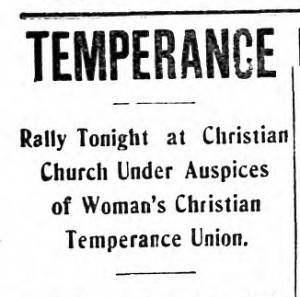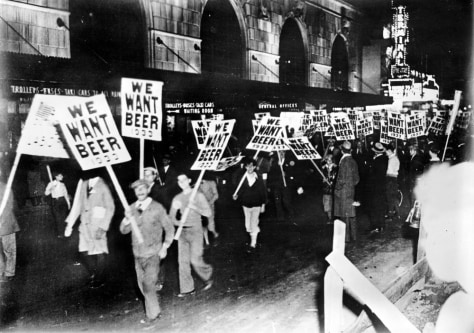To survive as a species, it has always, and will always take communication and working together, and bringing about great cultural change is a prime example of this. One man alone does not a movement make, and all of the great cultural movements in American society were orchestrated by not one man, but by groups of people collaborating together to bring about the change they desired. Prohibition is one such example, with both the bringing about of the 18th amendment and it's repeal with the 21st amendment, mass number of people worked together to make their ideas known and recognized by the higher government body.
 |
| A poster advertising a WCTU talk |
The origins of prohibition date back to a longstanding temperance movement among women, devout christian authorities, and progressives going back to the mid 19th century. These men and women had long since believed that alcohol and other impairing products led to a sinful populace and a horrible life for both women and children. These small movements, however, never gained much ground until the forming of the women's christian temperance union in 1874. This union of women began a crusade of rallies, talks, and anti saloon marches. This groups influence began to turn the wheels in favor of prohibition, beginning with county and city legislation, and moving on to state wide prohibition of alcohol in several "dry" states. This movement lost ground over time though, as it's interests became more widespread, including preventing poverty, improving working conditions, and aiming for world piece. This diversion of interests watered down their cause and made their points less impactful to a decreasing number of listeners as their organization slowly fell apart.
 |
| ASL propeganda |
|
With many organizations in the early 20th century protesting for temperance and prohibition, none of them were as well organized, or as successful as the Anti-Saloon league, the league which eventually convinced congress to propose the 18th amendment. While the WCTU was poorly organized and losing ground with people, the ASL had one goal, and one goal only: nationwide prohibition. The ASL didn't care who you were, what your beliefs were, or what political party you were with, as long as you supported prohibition. As proof, the ASL united with groups ranging from women's rights leagues, to christian unions, to even the klu klux klan in order to bring national prohibition. Beginning as a state organization in Ohio, the ASL brought about statewide prohibition, before setting its sights on even greater gains. With successful use of demonstrations, negotiation, and even blackmail, most politicians at the time came to fear the ASL, and knew they would cease to be in the business of politics if they dared defy it's wishes.
 |
| ASL world war I propeganda |
The ASL was directed, and was largely successful due to the efforts of one brilliant man, Wayne Wheeler. Beginning as a minister, he became a lawyer because he needed to be one to suit the ASL's needs. With his influence, the ASL focused solely on the national prohibition of alcohol, and with his style of propaganda, men, women, and children came to hate the liquor business. The vast majority of supporters were women, who wanted a safer home life and the knowledge that their husbands would be responsible and not drunkards. These women marched tirelessly, and diligently swayed mind after mind with the use of propaganda and real stories. With this demand for prohibition, more and more states became dry, and eventually Wayne Wheeler and the ASL were in a position to strong arm the government into passing the 18th amendment.
 |
| A rally to repeal the 18th amendment |
After the temperance movement finally had it's greatest success with the ratification of the 18th amendment, America soon learned the consequences of such radical action. While the idea of prohibition was good in concept, the government lost millions of dollars instantly from lack of liquor taxation, and therefore had no means to enforce the nationwide ban on alcohol. As mobs and bootleggers popped up more and more frequently, the police had less and less funds to stop them. And as a cultural side effect, the now taboo of alcohol just made it that more appealing to those willing to take the somewhat low risk to obtain it. With corruption spreading to the highest levels of politics, after nearly a decade the very same people who pushed for prohibition, instead rallied for its repeal.
Works Cited
"Alcohol, Temperance and Prohibition." Alcohol, Temperance and Prohibition. N.p., n.d. Web. 20 Feb. 2015. <http://library.brown.edu/cds/temperance/essay.html>.
Codding, J. K. "Prohibition in Kansas." Annals of the American Academy of Political and Social Science 32.Regulation of the Liquor Traffic (1908): 97-103. JSTOR. Web. 20 Feb. 2015.
Joy, Henry Bourne. "Prohibition against Human Nature." The North American Review 221.827 (1925): 608-11. JSTOR. Web. 20 Feb. 2015.
"Prohibition in the Progressive Era - American Memory Timeline- Classroom Presentation | Teacher Resources - Library of Congress." Prohibition in the Progressive Era - American Memory Timeline- Classroom Presentation | Teacher Resources - Library of Congress. N.p., n.d. Web. 11 Feb. 2015. <http://www.loc.gov/teachers/classroommaterials/presentationsandactivities/presentations/timeline/progress/prohib/>.
"Prohibition." PBS. PBS, n.d. Web. 11 Feb. 2015. <http://www.pbs.org/kenburns/prohibition/roots-of-prohibition/>.
Swallow, Silas C. "Prohibition: Why?" The North American Review 179.575 (1904): 550-54. JSTOR. Web. 20 Feb. 2015.





I was surprised to find out that women had so much of a major role in bringing prohibition about. You mentioned that the same people that supported it initially began to ague for repeal--was that true for the women organizers of the movement as well? I was a little confused about the abrupt ending but otherwise good work!
ReplyDelete1. I did not know that a christian's women organization were the ones to push for the prohibition
ReplyDelete2. Why don't you talk about who started the women's movement for prohibition?
3. Why wasn't there any mention of people who sold alcohol illegally?
I was unaware that prohibition was nationwide. I always just assumed it was an attempt that never really worked completely because of bootleggers. What exactly is temperance? I know it's similar to prohibition, but not quite the same. I also am confused as to why the propaganda for ASL used the whole "mother or saloon" slogan because wouldn't that make the workers/owners of the saloon mad and not want to join in?
ReplyDelete